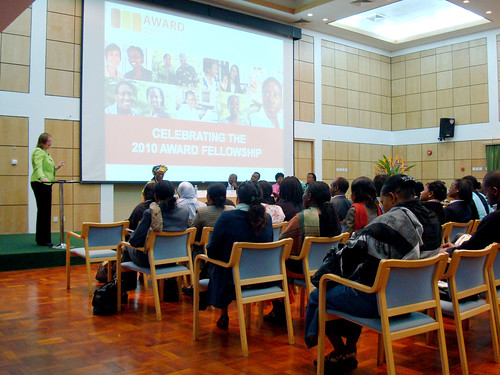
Sixty outstanding women agricultural scientists from 10 African countries this week received 2010 fellowships from African Women in Agricultural Research and Development (AWARD), an initiative of the Gender and Diversity program of the Consultative Group on International Agricultural Research (CGIAR).
In an award ceremony held at the CGIAR World Agroforestry Centre (ICRAF) in Nairobi, Kenya, on 27 July 2010, women scientists from across the continent, including a fruit pathologist, a catfish breeder and a pigeon pea researcher, were recognized and honoured for their contribution to alleviating hunger and poverty in Africa through their agricultural research and innovation.
Over 780 women scientists from 54 institutions competed for this year’s fellowships.
Margaret Lukuyu
One of this year’s winners is Kenyan Margaret Lukuyu, who worked with the International Livestock Research Institute (ILRI) in a Kenya Smallholder Dairy Project that helped raise milk production among the country’s smallholder farmers. Lukuyu’s role in this project, conducted from 1997 to 2005, was to research and promote strategic concentrate feeding regimes that could be easily adopted by Kenya’s many smallholder livestock keepers. This project not only helped better the livelihoods of smallholder dairy farmers in central Kenya but also was instrumental in bringing about national dairy policy reform and increased support for the country’s massive ‘informal milk sector’, which trades in unpasteurized (‘raw’) milk.
‘I’m excited by the AWARD Fellowship and honoured that my work in improving the dairy sector has been recognized,’ she said. Now working with the Kenya Agricultural Research Institute (KARI), Lukuyu is looking forward to the training and other benefits she will now receive from the AWARD program, including building her leadership qualities, learning how to write grant proposals and to access information, and opportunities to network with other scientists as she embarks on her PhD research.
Esther Kanduma
Esther Kanduma, another 2010 AWARD winner, is a researcher based at the Biosciences eastern and central Africa (BecA)-ILRI hub located within ILRI’s Nairobi laboratories. Kanduma is focusing her PhD studies on using the genetic diversity of the tick Rhipicephalus appendiculatus, which transmits the parasite that causes East Coast fever to livestock, to come up with effective anti-tick vaccines. The award recognized her contribution to ILRI’s East Coast fever vaccine project, which is currently piloting a vaccine in East Africa to protect the region’s cattle herds against this lethal infection. ‘Through the exposure that AWARD fellowships provide, I hope to improve my ability to communicate, to increase my professional visibility and to help build a network of scientists researching tick and tick-borne diseases,’ she said.
Other winners of AWARD 2010 fellowships doing agricultural research at ILRI include Bridgit Muasa and Teddy Amuge.
Speaking during the ceremony, Vicki Wilde, director of the AWARD program, said: ‘Today we debunked the myth that qualified African women researchers “aren’t out there”—an excuse often used to justify why women aren’t hired or promoted within agricultural research institutions, universities and corporations.’ The AWARD fellowships, she added, show that ‘African women are offering smart and innovative solutions that are relevant to real issues in the continent’.
Now in its third year, the AWARD program has received over 1600 applications by qualified women scientists from all over Africa. It has awarded over 180 fellowships, with the fellows benefiting from two years of hands-on training in mentoring, partnerships, science skills, and leadership. The fellowships are awarded for intellectual merit, leadership capacity and the potential of a scientist’s research to improve the daily lives of the continent’s millions of women and other smallholder farmers. Through its fellowship program, AWARD works directly to break down traditional barriers to the development of female scientific careers. Such roadblocks include a lack of role models and mentors for aspiring African women agricultural scientists.
The AWARD program is a project of the CGIAR’s Gender and Diversity Program and is supported by the Bill and Melinda Gates Foundation and the United States Agency for International Development.
A list of 2010 AWARD Fellowship Recipients including their research topics is available at http://awardfellowships.org/~awfellow/images/stories/award/downloads/2010%20Fellows_research%20areas.pdf
To watch the speech by Vicki Wilde, Director, CGIAR Gender & Diversity Program and AWARD, please visit http://www.blip.tv/file/3935740.
To watch the speech by Dr. Akinwumi Adesina, Vice President (Policy and Partnerships) for the Alliance for a Green Revolution in Africa, please visit http://blip.tv/file/3934337.
For a related article please visit http://www.genderdiversity.cgiar.org/newsletter/GD%20News96_AWARD2010_Special%20Issue_full%20story.pdf
For more information please also visit www.awardfellowships.org and www.cgiar.org

